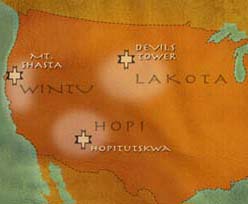Americans have unjustly taken vast tracts of land. This Presidents' Day, let's uphold our treaties and return it
By Steven Salaita
It’s rarely a good idea to ask rhetorical questions that have literal answers. Yes, the United States absolutely should return stolen land to the Indians. That’s precisely what its treaty obligations require it to do.
The United States is a settler nation, but its history hasn’t been settled. Yet most people invoke Natives as if they lost a contest that entrapped them in the past—and this only if Natives are considered at all. As a result, most analyses of both domestic and foreign policies are inadequate, lacking a necessary context of continued colonization and resistance.
For Natives, political aspirations aren’t focused on accessing the mythologies of a multicultural America, but on the practices of sovereignty and self-determination, consecrated in treaty agreements (and, of course, in their actual histories). Treaties aren’t guidelines or suggestions; they are nation-to-nation agreements whose stipulations exist in perpetuity. That the federal government still ignores so many of those agreements indicates that colonization is not simply an American memory.
Naturally, most Americans don't think this way. In particular, I mean the conservative liars and hypocrites who say they support the Constitution. Especially those who say they support the Founders' "original intent."
No, they don't.
Obviously they don't support obeying lawful treaties and giving back the land. You can bet they wouldn't support other constitutional measures such as establishing a national bank, making the Louisiana Purchase, or emancipating the slaves. But they would support limiting voting to white property owners and keeping women and minorities in their second-class place. That's the "intent" they're happy to support.
For more on treaties, see "Got Land" Shirt Stirs Controversy and Canada Owes Billions for Unfulfilled Treaties.


No comments:
Post a Comment